It's Inauguration Week! Let the Fun Begin!
View details for Inauguration Day and access the full schedule of events.
View details for Inauguration Day and access the full schedule of events.

Waste is a complex subject—simultaneously the discarded excess of our everyday lives and a resource on which other people depend for their livelihood; a problem for governments and businesses; and an idea with wide ranging cultural and social connotations. Beliefs about waste and waste management practices are culturally and socially specific and vary from region to region. Yet with increasing globalization, practices and beliefs about waste in any particular place are consequential on a global scale.
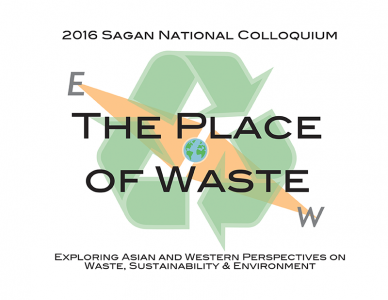 The Place of Waste: Exploring Asian and Western Perspectives on Waste, Sustainability, and Environment
The Place of Waste: Exploring Asian and Western Perspectives on Waste, Sustainability, and EnvironmentWaste beliefs and practices change over time and diffuse through geographic space. Waste is therefore an ideal lens through which to engage an array of vital, current issues, and grappling with its complexity requires insights from across the academy (social and natural sciences, humanities and arts), public governance and private enterprise. Waste, then, is ideally approached from an integrated, engaged liberal arts perspective.
Ohio Wesleyan obtained a grant from the Henry Luce Foundation to benefit our students and programs, co-directed by John Krygier (Environmental Studies, hereafter ES) and Jim Peoples (East Asian Studies, hereafter EAS). Our focus was waste, broadly defined, in an Asian/Western comparative context. Our project was exploratory: we are asking participating faculty and collaborators to consider the concepts and applications related to waste within their fields or disciplines. Participants were not expected to be experts in waste or waste related fields; instead, this was an interdisciplinary learning experience for all participants.
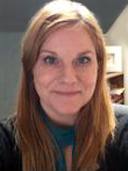 Sarah Moore, Ph.D., assistant professor of geography at the University of Wisconsin-Madison. Moore’s research focuses on the political economy and regulation of hazardous-waste trading in North America. She is the co-author of “Environment and Society: A Critical Introduction” and has earned National Science Foundation funding to work with two other primary investigators to create and analyze data tracking hazardous materials traded for disposal or recycling among Canada, Mexico, and the United States.
Sarah Moore, Ph.D., assistant professor of geography at the University of Wisconsin-Madison. Moore’s research focuses on the political economy and regulation of hazardous-waste trading in North America. She is the co-author of “Environment and Society: A Critical Introduction” and has earned National Science Foundation funding to work with two other primary investigators to create and analyze data tracking hazardous materials traded for disposal or recycling among Canada, Mexico, and the United States.
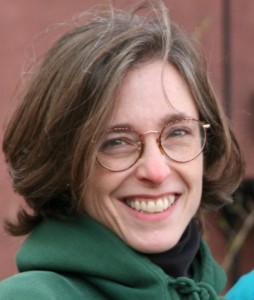 Robin Nagle, Ph.D., director of the Draper Interdisciplinary Master’s Program within the Graduate School of Arts and Science at New York University. A cultural anthropologist, Nagle’s research emphasizes the many forms of labor and infrastructure required by waste and the organizational demands it places on urban areas. She is the author “Picking Up” and the anthropologist-in-residence for New York City’s Department of Sanitation.
Robin Nagle, Ph.D., director of the Draper Interdisciplinary Master’s Program within the Graduate School of Arts and Science at New York University. A cultural anthropologist, Nagle’s research emphasizes the many forms of labor and infrastructure required by waste and the organizational demands it places on urban areas. She is the author “Picking Up” and the anthropologist-in-residence for New York City’s Department of Sanitation.
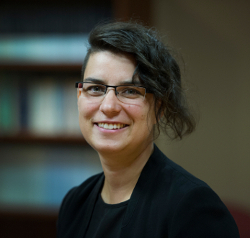 Max Liboiron, Ph.D., assistant professor of sociology and environmental sciences at Memorial University of Newfoundland. Liboiron discussed “Scientific Cultures and Controversies Over ‘Matter Out of Place.’ ” The founder and director of the Civic Laboratory for Environmental Action Research (CLEAR), Liboiron’s research focuses on how harmful yet invisible threats such as disasters, toxicants, and marine plastics become visible in science and evident in activism.
Max Liboiron, Ph.D., assistant professor of sociology and environmental sciences at Memorial University of Newfoundland. Liboiron discussed “Scientific Cultures and Controversies Over ‘Matter Out of Place.’ ” The founder and director of the Civic Laboratory for Environmental Action Research (CLEAR), Liboiron’s research focuses on how harmful yet invisible threats such as disasters, toxicants, and marine plastics become visible in science and evident in activism.
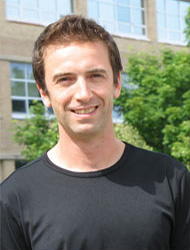 Josh Lepawsky, Ph.D., associate professor of geography at Memorial University of Newfoundland. Lepawsky discussed “Electronic Waste or How to Love a Mind Bomb.” His research examines the connections between geography and technology with a particular focus on the trade and traffic of e-waste in Southeast Asia. His recent publications examine the relationships between waste and value in global commodity chains. Lepawsky also is examining the prospects for “ethical” trade in e-waste and electronic rubbish.
Josh Lepawsky, Ph.D., associate professor of geography at Memorial University of Newfoundland. Lepawsky discussed “Electronic Waste or How to Love a Mind Bomb.” His research examines the connections between geography and technology with a particular focus on the trade and traffic of e-waste in Southeast Asia. His recent publications examine the relationships between waste and value in global commodity chains. Lepawsky also is examining the prospects for “ethical” trade in e-waste and electronic rubbish.
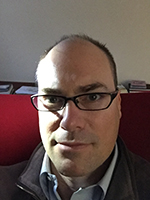 Peter Wynn Kirby, Ph.D., an environmental specialist and waste ethnographer in the School of Geography and the Environment, University of Oxford, United Kingdom. Kirby discussed “Smuggling, Burning, Burying, Shredding, Knowing: Varieties of Waste Work in East Asia.” His research focuses on toxic waste and nuclear risk in Japan – notably in the irradiated aftermath of the 2011 tsunami disaster in Tohoku – and scrutinizes the cultural underpinnings of environmental attitudes, from popular culture to conceptions of purity and pollution. He also researches transnational flows of waste and the resulting toxic fallout in China and elsewhere in East Asia (and beyond).
Peter Wynn Kirby, Ph.D., an environmental specialist and waste ethnographer in the School of Geography and the Environment, University of Oxford, United Kingdom. Kirby discussed “Smuggling, Burning, Burying, Shredding, Knowing: Varieties of Waste Work in East Asia.” His research focuses on toxic waste and nuclear risk in Japan – notably in the irradiated aftermath of the 2011 tsunami disaster in Tohoku – and scrutinizes the cultural underpinnings of environmental attitudes, from popular culture to conceptions of purity and pollution. He also researches transnational flows of waste and the resulting toxic fallout in China and elsewhere in East Asia (and beyond).